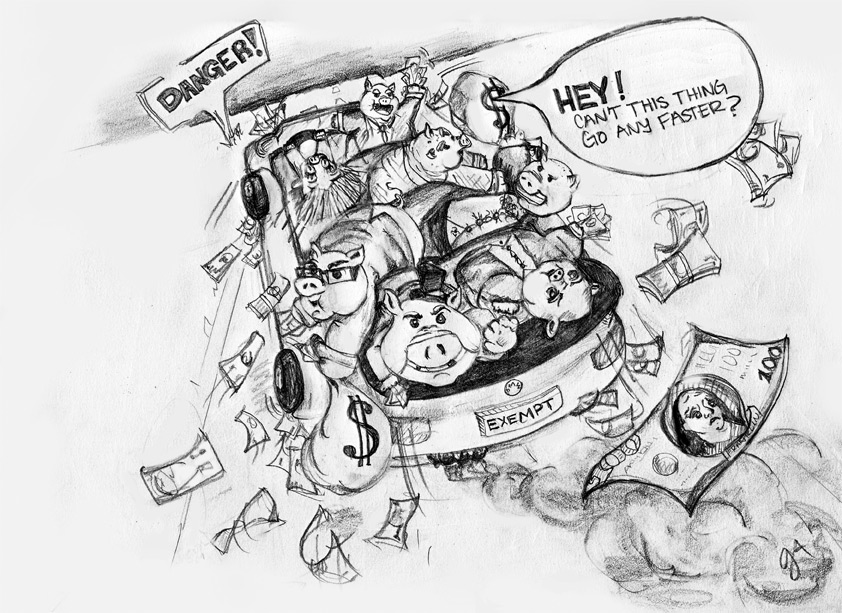In simple tribal societies, before historical civilization, culture, governance, and economy were determined by families and tribes. Language and culture might vary from one tribe to the next. As for governance, the eldest or strongest person might impose his rules on the others in exchange for their protection. This social organization can be compared to the formation of gangs in the midst of modern societies as well. Early economies were primarily based on hunting and gathering.
Foraging in Nature
Hunting and gathering is taking from nature for oneself and group. Animals are also hunter-gathers eating food for which they forage or hunt and kill. The size of hunter-gather tribe, or a herd of animals, is limited to the natural food accessible to them. The economy of a hunter-gather society is win-lose, because it is based on taking or appropriation. If one group gets the deer or the berries, another group will not.
Hunter-gatherers are forced to live within the limits of nature’s provision. If they were to settle in a fixed location, a sustainable society will require some form of population control so as not to deplete the food sources around them. Strategies could include limiting marriage to chiefs, child sacrifice, euthanasia, genital mutilation, or some other form of birth control. The natural abhorrence of such practices means practically that a hunter-gather group will either be nomadic, or expand through conquest, taking the resources from other locations, often killing or driving away other groups living on those territories.
Foraging in Modern Society
We normally think of hunter-gatherer societies as tribes foraging for plants or animals to eat. However, many people in modern societies hunt and gather. Robbing a bank, theft of a bicycle, kidnapping a child, seizing an industry, and bribing a politician to give you other people’s tax dollars are all forms of hunter-gather mentality on display in the contemporary world.
Gangs are simple face-to-face social groups that take on many characteristics of tribes. Gangs and mafia groups that live off of extortion and theft of other people’s money or property are the most blatant and visible form of hunter-gatherers because they use physical force.
Fraud, deception, and swindles are narratives used as modern hunter-gatherer techniques used to convince people to voluntarily hand over money or possessions in exchange for something promised in return that is never given, as was probably never intended to be given. A ponzi scheme is used to bolster confidence in a swindle because it rewards the first group of recipients as promised out of the proceeds from a larger group promised the same reward. This cycle repeats until there are no larger groups remaining to swindle and the ponzi scheme collapses.
Governance and Theft
Since the dawn of civilizations, theft has been outlawed and condemned because it undermines social functionality and property rights. In the West, the biblical commandment “Thou shall not steal,” was predated by the Hammurabi code and was necessary to protect the produce of the irrigated fields of Sargon the Great. Laws do not always protect everyone’s property equally, with various forms slavery, discrimination, exploitation, and extortion that is a form of hunter-gather mentality used by leaders against groups of people under their control. Demands for the equal protection laws follow from critiques against the “legal” theft by elites that create laws to legalize such theft.
Corruption and Ideological Fraud
Concentrations of wealth and power are targets for theft. Banks are targets of robbery because they have concentrations of money. Gold shipments have been targets for the same reason. These are easily visible forms of outright theft. However, political abuse and corruption and the use of ideology to perpetrate fraud are less clearly understood forms of theft that are currently breeding inequality and injustice ravaging the world. Here are examples of hunter-gather mentality at work in 21st century society.
Crony Capitalism: In crony capitalism, laws are created to concentrate and retain wealth earned through investment in other people’s businesses. For example, taxing income from investments at a lower rate than taxing earned wages of the workers in those businesses is a way to provide an income advantage to the investors over the producers. There is a well-known example of how Warren Buffet pays less in taxes than his secretary–at least percentage-wise.
This growing wealth inequity is facilitated by laws that are passed by government legislators and often drafted by lobbyists and hidden in large omnibus bills because they would not pass as stand-alone bills on their own merit. These forms of “theft” are very difficult to reform because people who control power are complicit in it, making unethical laws legal.
Other laws are written in order to concentrate the capital in the first place. For example, in the United States, 401K and 403B retirement plans defer tax on working-class investment accounts largely managed and concentrated in the hands of Wall Street investors. These large concentrations of funds coming from factory workers, school teachers, and other wage earners are used to purchase, consolidate, and relocate businesses in ways that maximize investor profits often at the expense of loss of traditional middle-class working jobs.
In United States politics both Donald Trump and Alexandria Ocasio-Cortez recognized the existence of this corrupt process and the suffering it has caused average citizens, even though their solutions were often ideologically opposed–what Eric Weinstein has called the “cults of wokestan and magastan.” The current corrupt process he refers to as “kleptocracy.”
Communism: Communism is an ideological narrative that exposes injustices of the current system as a means a promised utopia for people who will follow them in conquest and theft through the forceful seizure of wealth and power. Hence, the solution to the theft that exists, is another form of theft. One cry of the Marxist-Leninist revolutionaries was “seize the means of production.” Communists thus combine hunter-gatherer mentality with the fraudulent idea that somehow seizing and redistributing what exists will magically provide enough wealth for everyone. In all instances of such theft, the people perpetrating the fraud took the wealth and possibly threw a few crumbs to the masses.



